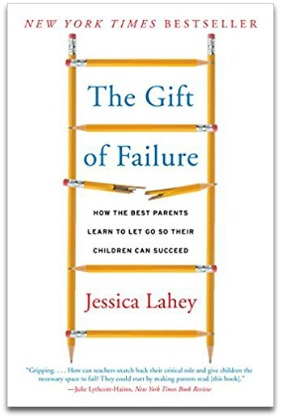 The first time my son got a failing grade on a math test, I flipped out.
The first time my son got a failing grade on a math test, I flipped out.
“What do you mean you got a 1? How is it even possible to get a 1? I know you studied for the test. Your Dad reviewed the whole chapter with you,” I kept saying.
My 7th grader replied helplessly: “I don’t know, Mom. I got most of the answers right, but the teacher gave me a failing grade because I didn’t show my work.” And then, a bit more confidently, “What’s the big deal anyway? It’s just one test.”
I had to take a deep breath and count to 10 to avoid saying something I would later regret.
My son’s words went against everything I believed about the importance of school.
Growing up in Russia, I was always a straight-A student.
School was easy for me. I was bright, self-motivated and compliant, eager to please my parents and teachers. I happily did my homework without being prompted. I did oodles of after-school activities – singing, dancing, playing the piano, art, swimming.
Frankly, I never got a B because it didn’t cross my mind that it was even an option.
It didn’t matter whether I liked a particular subject, I would still get an A in it. In our culture, everyone strove to get As.
I graduated from high school with a Gold Medal – the highest honors you could get when you ace all your subjects on the final exams.
I then applied to – and got into – the best university in Russia: Moscow State University. This was despite me not being from Moscow, having no connections or money, and my parents being hardworking blue-collar workers in a provincial city. (The college admissions scandal here in the US pales in comparison to what was going on in Russia back then. Only Communist party leaders or well-heeled professionals could get their kids into Moscow State – usually by having members of the admissions committee be their kids’ paid tutors, or doing other favors for them).
After 2 years in Moscow, I went to Wellesley College and graduated summa cum laude. From there I went straight to Stanford, to get my Ph.D. in Psychology.
I was a huge achiever! How could my children not find academic achievement as important?
My older son, a 7th grader, asked me whether I expect him to always get As. I said, “No, honey, it’s not about you always getting As. It’s about you always doing your best.”
“I don’t want to be the best. I don’t want to be the worst, either. I want to be normal. Average.”
Wow! That blew my mind.
After a lot many more deep breaths, here’s what I did to help.
Talk to Your Kid
 After a long conversation, it dawned on me that this is my son’s way of trying to fit in with his peer group. He didn’t want to stick out academically. He didn’t want to be better than everyone else, or worse than everyone else. He wanted to fit in. He wanted to be “normal.”
After a long conversation, it dawned on me that this is my son’s way of trying to fit in with his peer group. He didn’t want to stick out academically. He didn’t want to be better than everyone else, or worse than everyone else. He wanted to fit in. He wanted to be “normal.”
But I still worried about his academic achievement. I wanted him to be able to go to any college he wanted. To pursue the career of his dreams. And, like it or not, grades were one part of helping him achieve his dreams.
Meet with Their Teachers
My son complained about how inflexible his math teacher was, how she insisted that he not only get to the right answer but use her exact methods and show all the work, step-by-step.
My response was, “Welcome to real life. Your teachers and your bosses will expect you to do things their way. And you have to do it.”
I asked my son’s math teacher for a parent-teacher conference. My goal was not to complain or to advocate for him but to get her advice on how to best help him. I’m so glad I met with her. She gave me a lot of great practical advice – including how my son could re-take the test that he had failed.
After many conversations, my son and I agreed that he would try his best at school. His goal is to get the kinds of grades that would allow him to get into college and pursue his dreams.
Encourage Friendships
My younger son is on the spectrum and has been diagnosed with anxiety. School was a nightmare for him.
However, he had one good friend in his classroom. We engineered as many social interactions with that friend as we could, both in and out of school. We let him play video games with his friend as well as encouraged them to go to school-sponsored activities.
Now in 5th grade, my son still has the occasional meltdown, and I still get the occasional call from the office. But there are a lot more good days than bad days.
Find their Passion
 After a trip to a space museum our younger son has a new obsession – science and space. He wants to be an astronomer when he grows up. He watches science shows non-stop, recites adult books about space chapter and verse, and quizzes me endlessly about stars and planets.
After a trip to a space museum our younger son has a new obsession – science and space. He wants to be an astronomer when he grows up. He watches science shows non-stop, recites adult books about space chapter and verse, and quizzes me endlessly about stars and planets.
Finding a kid’s passion can be the key to helping them succeed in school – in any subject.
We use his obsession with space to help him be more engaged and active at school. Normally painfully shy about presenting in front of a class, my son happily volunteered to do a special presentation about stars. The most challenging thing about it was fitting everything he wanted to talk about in a short 5-minute presentation!
To encourage reading we give him books about constellations and astronauts. To encourage math we ask him how many days would it take a rocket ship to reach the moon if the rocket could only go 150 miles per day.
When his class had a field trip to the planetarium, his teacher gave my son a special role to help answer his classmates’ questions. Talk about a leadership opportunity!
My son now excels in science. He is also doing reasonably well in math and English. Phew!
Support with Tutors
 Both of my sons are now in private tutoring for math, for 2 hours each week.
Both of my sons are now in private tutoring for math, for 2 hours each week.
While both initially resisted the idea of getting a tutor, they agreed to give it a try. Having many friends who also get private tutoring helped – my sons don’t feel like they are doing anything unusual. (Again – they felt “average.”)
I was pleasantly surprised by how much both of my kids are enjoying tutoring. They actually look forward to it!
By definition, private tutoring is completely personalized to each child. They enjoy learning at their own pace, getting the tutor’s undivided attention and mentoring, and taking on new learning challenges that are far more complex than what their peers are doing in school. And their grades are improving.
Grades are Not the Only Marker of Success
While neither of my sons has the same attitude towards getting A’s as I did when I was growing up, I’ve made peace with it. Mostly.
I realized that part of the reason why I was so upset with my sons not being “into” school was because of how it reflected on me as a parent.
I viewed it as my job to instill in my kids a love of learning, a relentless work ethic, and a sense of responsibility. If they were failing at school, I was failing at my job as a parent.
 But in her wonderful book, The Gift of Failure, Jessica Lahey reminds us that grades are not a true measure of ability. While grades do measure executive function, compliance, and self-discipline, they are still less important than learning.
But in her wonderful book, The Gift of Failure, Jessica Lahey reminds us that grades are not a true measure of ability. While grades do measure executive function, compliance, and self-discipline, they are still less important than learning.
Instead, Lahey recommends that we focus on the goals a child has and supporting them while they strive to achieve those goals. Let’s say my youngest son wants to become an astronaut. That is a great goal!
Together we can talk about what it is going to take to reach that goal. He’s going to need to get into a good college. In order to get into a good college he’s going to need a great application – essays, grades, extra-curricular activities. Maybe he will even want to go to science camp.
And that goal is on him. He is the one who will have to do the hard work to get there. Sure, I can help a little along they way. I can drive him to camp, pay for tutors, and be his cheerleader. But the real work is all him.
Inspired by Jessica Lahey’s advice, I now view my kids’ performance at school as their responsibility, not mine. I’m only there to help them if they need me.
I resist the temptation to re-write their essays, to color and glue their science fair projects, or to harp on them about their homework. The less I push, the more initiative and responsibility they show.
When one of my sons bring home his school report card, I review it, my husband and I discuss it, and then I have a long, unhurried conversation with my son about it. I do more listening than talking, let him reflect on his grades and come up with an action plan if needed.
With my more relaxed attitude, we’re happier and less stressed as a family. Homework is no longer a struggle, and counter-intuitively, my kids’ grades are improving.
The 2-Minute Action Plan for Fine Parents
Time for our 2-minute contemplation questions:
- How well did you do in school when you were growing up?
- How did you feel about school?
- How does your own school experience affect your parental attitude towards school?
- Do you act as a Helicopter Parent or a Tiger Parent when it comes to your kids’ school performance?
- How does your hovering affect your kids?
The Ongoing Action Plan for Fine Parents
Over the next few weeks, try to give your kids more responsibility for their school performance.
Accept that your kids are not you. You and they are different people. You have different personalities, capabilities, and attitudes towards school. Your kids are growing up at a very different time than you did. They can’t help but be shaped by their social milieu, for better or for worse.
When discussing school with your kids, practice active listening. Ask clarification questions. Listen more. Talk less. You might be surprised by how self-aware your kids are, and how eloquently they can explain their behavior or attitude towards school.
If your kid brings home a bad report card, take a deep breath, pause and reflect. And then talk to your kid, practicing active listening.
If homework is a struggle, try these helpful tips.
Ask to meet with your child’s teacher. Most schools hold parent-teacher conferences twice a year. If you feel you can’t wait until the next regularly-scheduled time, email your teacher and ask to set up a separate time to meet. Most teachers would find the time for a brief session, usually right before or right after school.
Last but not least, take comfort in knowing that you’re a fine parent. And your kids will be just fine, in school and beyond.
Hello! you gave good information about what problems did children face while going to school and gave tips for that really thank you for sharing your knowledge. Here there is also a competition on the children’s website and check the link. http://kidteck.com/c/st
Very good advice. I too had to disconnect my ego and self-image from my children’s grades and activities.
Listening more and talking less is important. Children appreciate having their feelings and goals heard, respected and supported.
Thank for this wisdom.